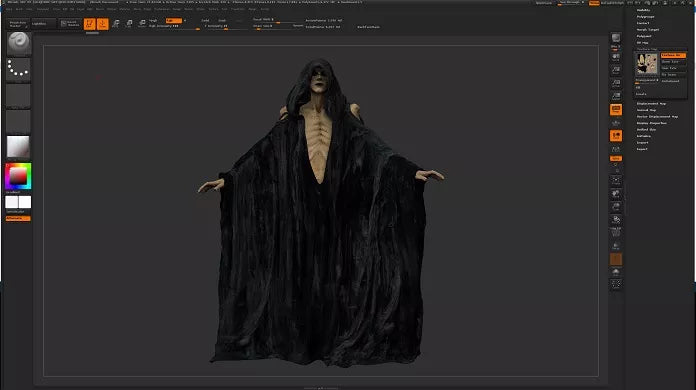
Summary: The special effects team working on an episode of the popular series Sleepy Hollow needed to create a highly-lifelike digital double of an actor wearing a very specific and unusual costume.
The Goal: To use a handheld 3D scanner and create a realistic digital double of a fantasy character. The final results should be so lifelike that viewers don’t doubt that what they’re seeing on the screen is the costumed actor himself.
Tools Used: Artec Eva, Artec Spider, Artec Studio
Want to know how Artec scanners deal with hard-to-scan black surfaces? Let’s hear from Second Chance Games & Visual Effects, who scanned an actor in a very sophisticated robe for an episode of the TV series Sleepy Hollow. Second Chance Games & Visual Effects is an Atlanta based media provider of digital assets for the games, visual effects, and 3D visualization industries.
The studio developed a digital double of Wraith, an ancient demon played by actor Alexander Ward in the episode titled, “Whispers in the Dark,” Season 3 Episode 02 (©20th Century Fox).


The digital double of Wraith, with and without texture
“The robe he was wearing was made of different fabrics. Some of the robe was mesh-like, where you could see through it,” said Vic Holt, Vice President of 2cgvfx. “To some degree it was shiny and black...two very difficult things to address in a scan!”
Vic attempted to scan the robe using standard settings, but then realized some of them needed to be tweaked. “The settings had to be changed on the texture brightness, bringing it down a small amount to take the glare off, so the scanner could see better. Also, we adjusted the sensitivity up some and just had to move slow,” said Vic.
The area to capture was quite large, and the team had to scan in sections with plenty of overlap, so alignment could be done well. They used Eva for the robe and Spider for facial areas with great detail.
Second Chance Games & Visual Effects was introduced to both scanners by Artec Certified Reseller Rapid Scan 3D. In the words of Chris Strong, President of Rapid Scan 3D, “Eva and Spider have been two of the most popular handheld 3D scanners on the market, from CGI to aerospace, archaeology, reverse engineering, and beyond. If you’re capturing medium-sized objects and reliable, high-resolution results are vital, you need to check out Eva. The Artec Eva is amazing for scanning people and body parts and that’s what Second Chance Games & Visual Effects needed. Talking about Spider, where this ultra-resolution 3D scanner truly soars is when you need to capture tiny details or complex geometries. This can mean printed circuits, machine parts, dental components, jewelry, and that’s just a brief list.”
Vic Holt shared a few details about the scanning process, “The robe weighed a good bit, and we had the actor stand on a turntable with poles to rest his hands on, keeping his elbows locked into position.” He continued, “We knew going in that the robe would probably fall off our very large turntable, so I went to our shop and cut a larger piece of wood to be affixed to the top of it, to hold the extra cloth material instead of it dragging on the floor when we spun him.”
Vic also used a special handle hooked to the scanners on one side, and on the other side there was a small monitor hooked to the HDMI port of the computer. “It allowed me to see what I was scanning rather than having to look over at the computer,” said Vic. “I just mirrored over the display and had Artec doing a Real Time Fusion while saving the raw scan file in the background.”


Vic Holt using a special monitor fixed to Eva during a scanning session.
After scanning the robe, the team had to remove it and do more scanning of his body, just in case the robe moved and the chest area would be exposed. “So we basically had two separate scans to work on….the robe and the guy underneath it,” said Vic.




Then the models were rebuilt and remeshed in ZBrush, so they could be altered and animated. “The mesh work needs to be done in a way that is optimized for animating as well as in not hindering during the rendering phase,” said Vic. “We provide the model as optimized as possible, so it’s easy to deal with by the VFX department.”

A still of Wraith in Season 3 Episode 02 of Sleepy Hollow.
“It’s been real fun creating digital doubles of wonderful creatures this show has developed,” said Vic. “Their attention to detail is quite evident in watching the show, as my wife and I have done since its beginning.”


